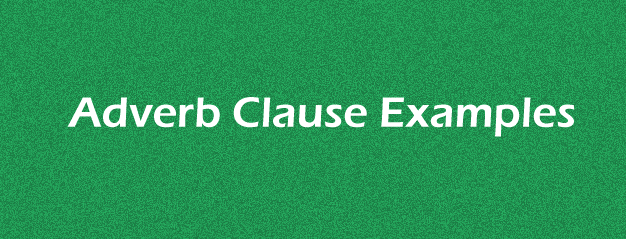Adverb Clause ExamplesSometimes, a sentence may clarify its message but still require some additional details. So in that case we utilize an adverb whenever we have to deal with such a sentence while writing. This is the reason why the English Language has them. However, at times a sentence requires little more than an adverb. It requires more context to convey the answer to the what, where, why, and/or how behind the primary clause. In this scenario, one may accompany one sentence with the other, or one may utilize an adverbial clause. An adverbial clause refers to the depending clause which alters the verbs, adjectives, or adverbs in its sentences. In simple and refined words, adverb clauses are the clauses that do the same thing as adverbs. 
What Is an Adverb Or Adverbial Clause?The adverbial clauses are also known as adverb clauses. It is a combination of words that function as the adverb when combined. The clause defines or changes the verbs, adjectives, or other adverbs. Adverbial clauses, unlike various kinds of clauses, are most often dependent clauses. This implies that they cannot function as standalone sentences. Adverb clause enhance the sentences by incorporating the context and details that conventional adverbs lack. In the following examples, try and understand adverbial clauses and adverbs:
As seen in these instances, adverbial clauses can exist at any position in a statement. They can be actual or figurative, as in the last example's clause. Every aspect of speech, and each phrase and clause, is a tool with a defined function. Utilize an adverb whenever you require writing a short sentence. Use an adverbial clause to offer further details. However, an adverb clause is not solely a chain of words. To be comprehensive, a clause needs to have a subject and a verb. Subordinating conjunctions, like "after," "if," "because," or "although," come prior to the adverb phrases. So the adverb phrases refer to the set of words in a sentence that function like the adverbs but lack both a subject and a verb. Requirements Of an Adverb ClauseAs a result, adverb clauses must always meet three requirements :
Examples of Adverb ClauseHere are a few examples of adverb clause and their explanation of why, how, where, and when. 1. She resigned because she was dissatisfied with the new leadership. 2. They'll meet us at the field where we used to practice baseball. 3. The children can watch Television after they complete the schoolwork. 4. They were gossiping in the playground as if no one was watching. 5. We will let him perform if he passes the physical test. Utilizing the Adverb ClausesIncorporating the adverb clauses in the sentences is a brilliant method for adding crucial descriptive insight and detail to the written work. These clauses are adjustable and can be placed or fixed at the starting, middle, or conclusion of a sentence, depending on how these sound. Adverb Clause at the Start of a SentenceWhen used at the starting of sentences, the adverb clause is accompanied by the comma, as shown in the following adverb clauses examples :
Adverb Clause in The Center Of A SentenceAn adverb clause is separated by commas when it is put in the midst of a sentence. Take note that this is an uncommon placement that suggests a break in the main flow.
Adverb Clause at the Ending of the SentenceAn adverb clause requires no further punctuation when inserted at the conclusion of a sentence:
Look for a Subject and a VerbRemember to look for a subject and a verb if you are unsure whether a set of terms is the adverb clause. An adverb clause has both of those sentence elements and replies the questions of like how, why, when, or where. When used correctly, adverb clauses enhance your writing by adding additional depth and making your work as valuable and informative as feasible. Adverb Clause Examples on the Basis of Types of AdverbsAdverb Clause Examples of PlaceAn adverb phrase of place responds to the question WHY by describing the location of an activity. Examples:
Adverb Clause Examples of TimeA time adverb phrase alters a verb and informs us WHEN it occurs. Examples:
Adverb Clause Examples of Reason/PurposeA reason/purpose adverb phrase alters a verb and informs us WHY the action occurs. It explains why or what the action is being done. Conjunctions utilized in the below sentences include Because, as, so, since, so that, that. Examples:
Adverb Clause Examples of ContrastA contrast adverb clause alters a verb by providing contrasting details. Examples:
Adverb Clause Examples of ConditionAn adverb phrase of condition alters a verb by describing the context in which it occurs. Examples:
Next TopicRelative Clause
|
 For Videos Join Our Youtube Channel: Join Now
For Videos Join Our Youtube Channel: Join Now
Feedback
- Send your Feedback to [email protected]
Help Others, Please Share










